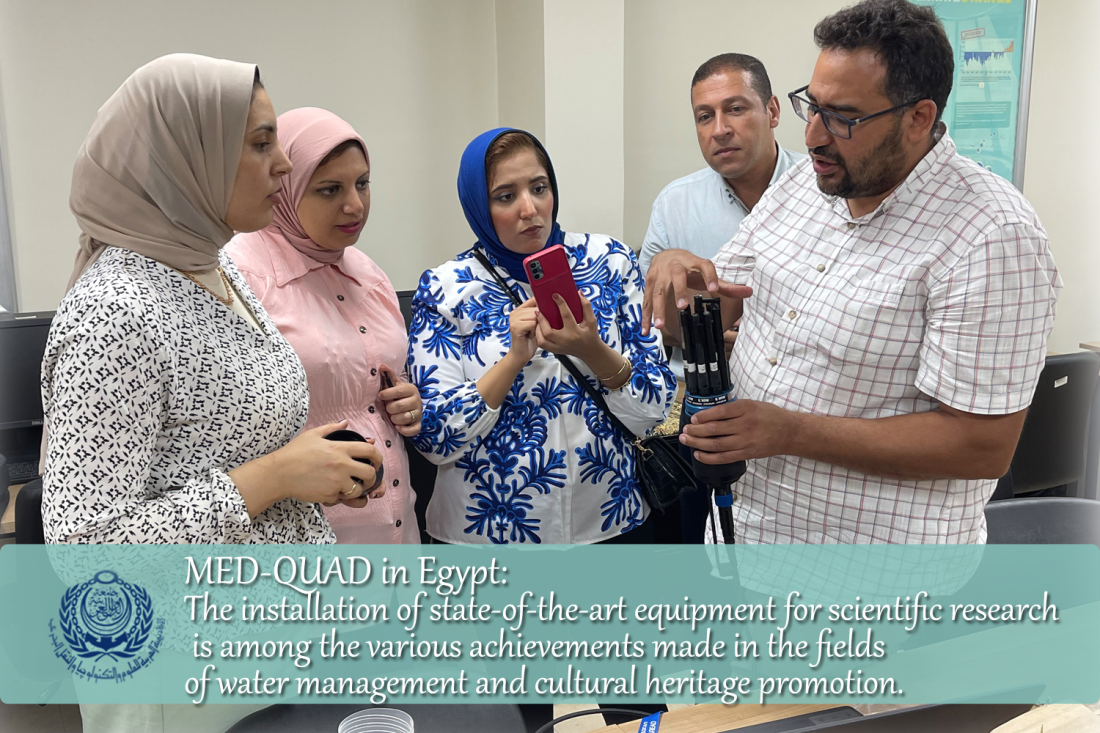Advancing water resource management and cultural heritage in Egypt: the experience of the MED-QUAD Project

The Arab Academy for Science, Technology & Maritime Transport (AASTMT), Egyptian partner of MED-QUAD project, actively participated in transferring innovative cross-border knowledge and skills during the project's implementation. Professor Yasser Gaber Dessouky, Dean of Scientific Research and Innovation and local manager of the project, representing AASTMT, expressed his satisfaction with the dynamic collaboration and shared the project's achievements both at the European and local levels. As pointed out by Professor Dessouky, in the context of the MED-QUAD project in Egypt, remarkable achievements have been attained through the adoption of the Quadruple Helix approach, ultimately resulting in the enhancement of water resource management and the preservation of cultural heritage. This partnership has forged the path towards progress in sustainable water management, community engagement, and state-of-the-art research. The following outcomes highlight the transformative impact that MED-QUAD has had on Egypt's water resources and cultural heritage preservation.
The project began by organizing a series of technical meetings, facilitating collaborative discussions on water management solutions and sustainable resource utilization. In Egypt, these meetings served as a critical platform for stakeholders and experts to convene, brainstorm, and formulate innovative solutions for pressing water-related challenges. In collaboration with the Alexandria Water Company, the SWUAP Lab (Smart Water Use Applications Living Lab) played a pivotal role in advancing water quality monitoring by integrating advanced technology for accurate and efficient data collection. Furthermore, SWUAP Living Lab sessions served as the hub for citizens, City Development Groups (consisting of representatives of the Quadruple Helix approach who participate in actions offering their know-how to society), and university experts, fostering a dynamic interface that encouraged community-driven service development and a deeper understanding of water management issues. The SWUAP Lab initiated ground breaking initiatives, including the deployment of smart meters in local households, which garnered recognition for their potential broader application by the Water Managing Authority. This innovative endeavor aimed to streamline water consumption and promote responsible water usage at the grassroots level. In collaboration with researchers from the AASTMT and the City Development Group (CDG) from Egypt, a comprehensive research project was launched to monitor groundwater quality, paving the way for sustainable water usage practices. Furthermore, the lab played a vital role in hands-on training, equipping CDG members and stakeholders with the necessary expertise to effectively utilize new water management technologies.
AASTMT played a significant role in organizing comprehensive training courses that aimed to enhance the role of academic and City Development Groups in promoting civic engagement and applying sustainable water management practices. The Egyptian partner organized an International seminar titled "Methods for shaping the Civic University," focusing on designing its role, tasks, and responsibilities within the Quadruple Helix model for innovation in the Mediterranean. The seminar took place from the 1st to the 2nd of November 2022 in Alexandria, with 15 participants. Additionally, at the same location, AASTMT organized the first training seminar on City Development Groups on the 21st of March 2023, which had 10 participants. Subsequently, the second training session, addressing the topic “How to Build Resilient Cities: Training for City Development Groups on Preserving Cultural Heritage and Mitigate Contemporary Challenges” was implemented on the 21st of May 2023, involving 30 participants. These courses not only disseminated essential knowledge but also encouraged active participation from the community. Practical sessions within the SWUAP Lab became instrumental in disseminating knowledge about water quality and management, empowering community members to play a proactive role in water resource management.
The MED-QUAD project has served as a catalyst for various activities, significantly contributing to the body of knowledge on sustainable water management practices and the promotion of cultural heritage. Also, an important research activity in the culture sector is in the final stage through cross-border collaboration with Al-Balqa Applied University, a partner in the MED-QUAD project from Jordan. This is about a “Risk management strategy for Jerash Museum cultural heritage site”.
The SWUAP Living Lab's research has produced significant results, including MSc theses that investigate the use of macroalgae as a sustainable bio-adsorbent for dye removal, aligning with Sustainable Development Goals (SDGs). Additionally, a key focus has been on spatial-temporal monitoring of groundwater quality, with a sharp focus on understanding the impacts of climate change. Collaborative publications have thrived, with cross-border research articles featured in respected journals like the Fermentation Journal and the Global NEST Journal. These articles cover a wide range of topics, from sustainable biomethane production to the agricultural benefits of zeolite and backwash water. Moreover, a study submitted to the Global NEST Journal sheds light on the utilization of Metal–Organic Frameworks in industrial wastewater treatment. Notably, research findings on the biosorption potential of red algae for dye removal were published in the Scientific Reports Journal, making a valuable contribution to the field of sustainable water treatment methods. From the other hand, the ARCHEO (Applied Research on Utilization of Cultural Heritage) Living Lab in Egypt utilizes virtual and augmented reality to offer a distinctive opportunity for visitors worldwide, whether they are physically present or virtually connected, to immerse themselves in rich cultural experiences.
The MED-QUAD project in Egypt has indeed emerged as a beacon of innovation and collaboration in the landscape of water management and cultural heritage preservation. The Living Labs, functioning as incubators for innovative solutions, and the unwavering dedication of the MED-QUAD team to collaborative and responsible research, have set a benchmark for future initiatives not only within the Mediterranean basin but also beyond. This project is making significant strides in advancing water resource management and cultural heritage, charting the course towards a more sustainable and culturally enriched future for Egypt.









